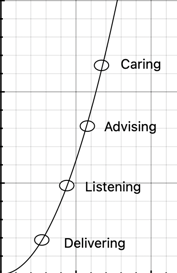An IT Quagmire The client had a problem: every software project they tried to run took forever to...
Grow accounts with better relationships

Developing healthy client relationships is critical to any service business. In this article we present a way to think about those relationships, and ideas for how your team can build better relationships with your clients. As your practice moves through these stages, you’ll find it’s much easier to retain and penetrate accounts, land referrals, and command higher fees for your services.
Not every client is interested in moving the relationship through these stages. The trouble is, you don’t know which are interested and which are not, so your firm has to try, again and again, to move to the next stage. We’ll talk at the end about some strategies for doing this.
 Delivering
Delivering
We did what we said we were going to do, no more, no less. This stage is table stakes, because firms that cannot deliver what they promise don’t deserve the business they get. Every firm should make certain it’s people manage client expectations all along the life of the project, and it’s on them to maintain clear communications on the its status, the causes of any delays, and how they’re responding to the challenges of the moment. Firms with people who don’t know how to do this compete on price alone, and there always seem to be bargain-hunting customers willing to take a chance on a low-priority project.
Mastering delivery is something most firms focus on intently, as it’s so core to the value the firm provides. It’s a worthwhile goal, but delivery is still table stakes: if delivery is your main value proposition, you’re doomed to competing on price. Because while not everyone actually can deliver, everyone says they can, and some of them are cheaper than you.
 Listening
Listening
Firms that can reliably deliver are ready to move on to listening to their clients. When they hear something that doesn’t make sense, they seek clarification, knowing that misunderstandings are always the firm’s problem (the responsibility flows in the same direction as money: to you). People in listening firms are always asking interrogative questions (who/what/when/where/how/why), and taking copious notes. They summarize conversations and decisions, and keep those documents at the ready when difficult situations arise.
Listening requires delivering (nobody cares if you’re a good listener if you can’t deliver), and requires the firm be comfortable enough with delivery that they can stop trying to protect themselves and actually pay attention to the customer. This is not a small lift: telling your people to be better listeners when they can barely deliver is the same as telling a college freshman to listen closely to a grad school class. They’re so busy worrying about how they’ll make sense of it that there’s no room for anything else.
 Advising
Advising
Eventually, if you’ve done a good job of delivering and listening, your clients will begin asking you for advice. They won’t ask for any substantial advice before this, because nobody wants advice from someone who can’t do deliver or from someone who doesn’t listen. But when enough trust has been built, clients become receptive to advice from partners.
Firms should value this stage as much as clients do: when you’re working in an advisory capacity, you’re able to frame the way your client perceives their challenges, and that is a powerful tool for deepening your relationship with the customers. You can help them see why your business is better than your competitor’s, you can help them understand what’s really going on during a project, and you can have a measurable impact on that client’s position.
Advice should only be given when requested by the client (you may prompt with a question like, “may I offer some advice?”) and should be transparent, open, and the best advice possible (i.e., never self-serving). Of course, your practice should receive a fee for this kind of service, either in the form of higher rates or value-priced through a separate practice.
Learning to give advice can only come with experience. Nobody can benefit from experience you don’t actually have, and if you’re just looking at the facts and giving an answer you’re an analyst, not an advisor. An advisor leverages their past to benefit the client’s future, and can see a bigger picture from a perspective that’s highly valued to the client.
 Caring
Caring
Caring might seem like a strange thing to include in this list. This is a blog for business owners, after all. But we all know that professional services is a relationship game, and when business is strained, whether due to budget cuts or missed deadlines, the relationship is often what holds the engagement together.
Of course, relationships take two, and not every client is going to care about you or your firm. But those caring relationships bring firms back again and again, paying off the original investment hundredfold.
Summary
- Every organization should be good at delivery. Delivery is table stakes, and anyone who can’t deliver should find other work while they upskill. Delivery-focused organizations inevitably wind up competing on price.
- To go from the delivery stage to the listening stage, while sounding simple, requires your team to put aside its own needs and focus intently on the needs of their clients. They need to ask interrogative questions and pay close attention to the answers to solve the real problem.
- From listening to advising takes years and practice. Not every gray-haired consultant has the skills to be a good advisor, but those skills can be developed and create impressive value (and fees).
- From time to time firms can develop close relationships with the people they advise. In my own practice this happens more often than not, due to the kind of personal value I bring to my clients. Not only is this work create a phenomenal ROI for my clients, it’s personally fulfilling for me to watch them create the life they want for themselves.
Helping your people move through these stages is one of the highest forms of leadership. As a leader in a professional services firm, you’re presented the opportunity to help people learn to overcome their challenges and truly care for another person, and reap the personal and professional rewards few others get to.
If you're eager to retain clients, secure referrals, and increase your service fees, it's time to take action. I'm here to help you and your team navigate these stages effectively. My specialized program is tailored for developers, delivery leaders, account managers, and team leaders to help each of these groups learn what they can do to move beyond delivery.
By enhancing your organization's skills in these areas, you'll not only meet client expectations but exceed them, leading to greater business success. Contact me now or schedule an introductory appointment to embark on this transformative journey, and let's elevate your technology firm to new heights!


